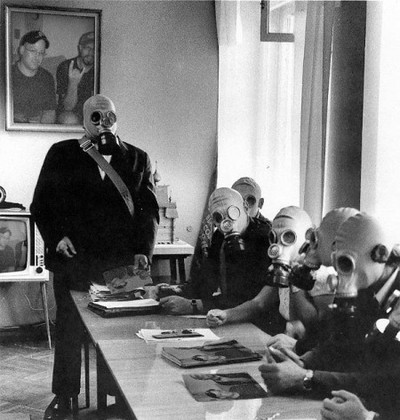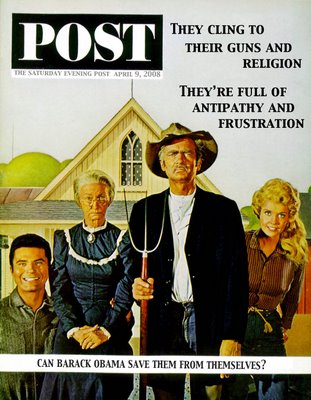by the Night Writer
Rich Karlgaard is among those pondering a return of the religious left:
Yet while secular politics are unwelcome in our church, I have noticed subtle shifts of late. The mood of the ministry and congregation is moving left. The music is moving toward a folk-rock sound of the 1960s and 1970s. Youth ministers wear berets and soul patches. The younger ministers don’t identify themselves as “Christians” but as “Jesus followers.” I would guess that most of them are Obama supporters, but I don’t ask.
To my thinking, “Christian” is ideally something that other people should call you because of what they see in you, rather than something you’d necessarily call yourself. “Follower of Christ” doesn’t do much for me, since Jesus had a lot of people following him around during his ministry, perhaps just for the food. Personally, I like “Imitator of Christ” myself (more on that later).
America’s religious left seems to be mounting a comeback. I’m happy for this development, even though my own tilt is to the right.
The religious left has a distinguished past in American history. It led the abolition fight in the 19th century. It led the civil rights movement in the 20th century. Organizations like the Red Cross grew out of progressive Christianity.
Yes, and I think the basis of America’s welfare program appealed to our country’s Christian heritage and the well-meaning desire to do good and to help the poor. That welfare has had the un-Christian effect of destroying families and perpetuating multi-generational poverty also has to be acknowledged — something the religious left is loathe to do. It has also been, at best, ambivalent about abortion, and its infatuation and even outright embrace of communist and socialist totalitarianism from the Soviets to Castro, Ortega on through Chavez, and it’s apparent commitment to replacing God with Government throughout U.S. policy is also disturbing. (That’s not to say the Religious Right hasn’t supported it’s share of dictators and made its own alliances of convenience).
The strange disappearance of America’s religious left during the 1970s has been noted but not examined much. My own guess is that drugs, music, sex, New Age religions, body worship, tree worship, earth worship and so forth, siphoned off an entire generation of seekers who had previously found their mystic/activist fulfillment in the left hemisphere of Christianity.
Now one detects that many old hippies, and sons and daughters of hippies, are returning to progressive Christianity.
We’ll see how this plays out politically. If there must be a left, then let’s cheer for a religious and not an atheistic left. However, I do think the trend benefits Democrats and is one reason why Democratic primary voter turnout has far excelled Republican voter turnout this year. The mainstream secular media, as usual, has utterly missed this story.
I think I agree with Karlgaard that if there’s going to be a left let it be a religious left rather than an atheistic one. My caveat, and especially my prayer (for both the left and the right) is that the focus is on seeking and doing God’s will, ideally by trying to be like Christ.
Earlier I mentioned being an “imitator” of Christ. Because we’re all human (left and right), it is an easy step to try and move from “imitator” to “impersonator”, wherein we try to rule by proclamation as if we, ourselves, were God. That’s certainly long been a fear and a warning from the left side of the church aisle regarding the motivations of the right, while the left’s own similar tendencies are ignored or attributed to “doing good” or “meaning well.”
My belief is that any “theocracy”, whether left or right, is fatally flawed by our own human imperfections and tendency to turn moves into movements; movements into monuments; and, ultimately, monuments into mausoleums. By all means, we should pursue faith in our lives and we should hope that our personal beliefs will be reflected in our public behavior individually and through policy. Our responsibilities to the poor (and the poor’s responsibilities to God and others); to be stewards of the earth; to deal ethically and compassionately with others are all things that must be done and honored by individuals, not discharged to a collective or government to be taken care of while we blithely go our own selfish way. As I’ve written here before, if God asks me if I helped the poor (as if He doesn’t already know) I don’t think He’s going to be impressed if I say, “Well, I paid my taxes.” Being religiously left or right, highly taxed or not, doesn’t lessen our responsibilities to do something on an individual basis, no matter how many marches, protests or church services we go to.
We often hear the phrase, “What would Jesus do?” as a guide to behavior. I suppose that’s all right as far as it goes. A better statement might be, “What is Jesus doing?” and then trying to line up with that. If we believe Jesus is still at work around us, and not that He’s gone off and left us to our own freedom-eroding devices, we can purpose to look for those things and and align ourselves accordingly. I urge those of the religious left, and my friends on the religious right, to put our focus on glorifying God, not our own group or idealogy. If we can do that — though we may disagree from time to time — I think we’ll be all right.













